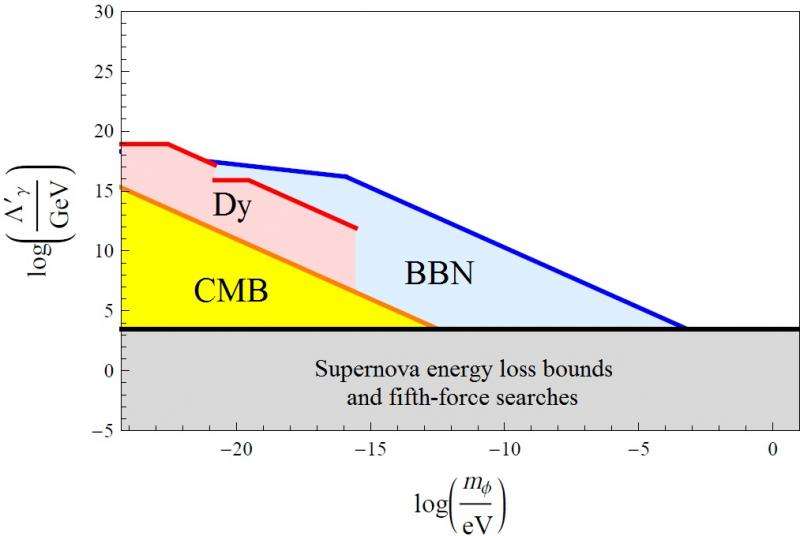November 19, 2015 feature
Dark matter might cause fundamental constants to change over time

(Phys.org)—The fundamental constants of nature—such as the speed of light, Planck's constant, and Newton's gravitational constant—are thought to be constant in time, as their name suggests. But scientists have questioned this assumption as far back as 1937, when Paul Dirac hypothesized that Newton's gravitational constant might decrease over time.
Now in a new paper published in Physical Review Letters, Yevgeny V. Stadnik and Victor V. Flambaum at the University of New South Wales in Sydney, Australia, have theoretically shown that dark matter can cause the fundamental constants of nature to slowly evolve as well as oscillate due to oscillations in the dark matter field. This idea requires that the weakly interacting dark matter particles be able to interact a small amount with standard model particles, which the scientists show is possible.
In their paper, the scientists considered a model in which dark matter is made of weakly interacting, low-mass particles. In the early Universe, according to the model, large numbers of such dark matter particles formed an oscillating field. Because these particles interact so weakly with standard model particles, they could have survived for billions of years and still exist today, forming what we know as dark matter.
Although these low-mass dark matter particles are weakly interacting, they are thought to still interact with standard model particles to some extent, but it's unclear exactly how much. By using data from experiments that have measured the amount of helium produced during big bang nucleosynthesis, as well as measurements of the rare element dysprosium and the cosmic microwave background, Stadnik and Flambaum have derived the most stringent limits to date on how strongly such dark matter particles interact with photons, electrons, and light quarks, improving on existing constraints by up to 15 orders of magnitude.
The new limits on the dark matter interaction strength allow for the possibility that an oscillating, low-mass dark matter field coupled to standard model particles causes variations in the fundamental constants. As the scientists explain, this could have important implications for understanding life's origins.
"The fundamental constants are 'fine-tuned' to be consistent with the existence of life in the Universe," Stadnik told Phys.org. "If the physical constants were even slightly different, life could not have appeared. The discovery of varying fundamental 'constants' may help shed important light on how the physical constants came to have their life-sustaining values today. We simply appeared in an area of the Universe where they are consistent with our existence."
Whether or not the fundamental constants actually do vary due to dark matter is still an open question, but the scientists hope that future experiments with atomic clocks, laser interferometers, and other devices may help test out the new idea.
"We have shown that linking dark matter and variation of the fundamental constants of Nature leads to a major breakthrough in the sensitivity of dark matter searches," Flambaum said. "We plan to continue searching for other novel signatures of dark matter that may lead to the direct detection of dark matter for the first time."
More information: Y. V. Stadnik and V. V. Flambaum. "Can Dark Matter Induce Cosmological Evolution of the Fundamental Constants of Nature?" Physical Review Letters. DOI: 10.1103/PhysRevLett.115.201301
Also at arXiv:1503.08540 [astro-ph.CO]
Journal information: Physical Review Letters
© 2015 Phys.org




















